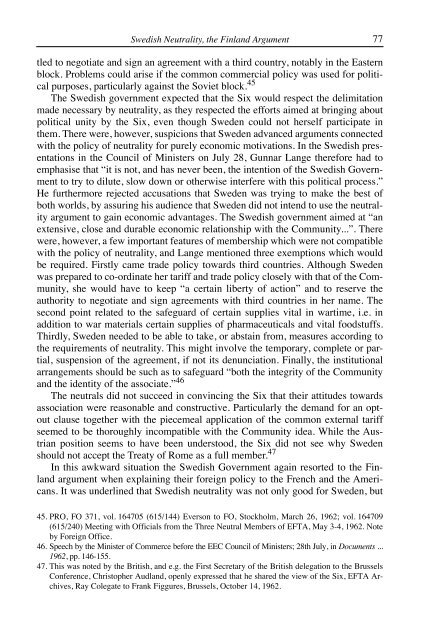Journal of European Integration History – Revue d'histoire de l'
Journal of European Integration History – Revue d'histoire de l'
Journal of European Integration History – Revue d'histoire de l'
- No tags were found...
Create successful ePaper yourself
Turn your PDF publications into a flip-book with our unique Google optimized e-Paper software.
Swedish Neutrality, the Finland Argument 77tled to negotiate and sign an agreement with a third country, notably in the Easternblock. Problems could arise if the common commercial policy was used for politicalpurposes, particularly against the Soviet block. 45The Swedish government expected that the Six would respect the <strong>de</strong>limitationma<strong>de</strong> necessary by neutrality, as they respected the efforts aimed at bringing aboutpolitical unity by the Six, even though Swe<strong>de</strong>n could not herself participate inthem. There were, however, suspicions that Swe<strong>de</strong>n advanced arguments connectedwith the policy <strong>of</strong> neutrality for purely economic motivations. In the Swedish presentationsin the Council <strong>of</strong> Ministers on July 28, Gunnar Lange therefore had toemphasise that “it is not, and has never been, the intention <strong>of</strong> the Swedish Governmentto try to dilute, slow down or otherwise interfere with this political process.”He furthermore rejected accusations that Swe<strong>de</strong>n was trying to make the best <strong>of</strong>both worlds, by assuring his audience that Swe<strong>de</strong>n did not intend to use the neutralityargument to gain economic advantages. The Swedish government aimed at “anextensive, close and durable economic relationship with the Community...”. Therewere, however, a few important features <strong>of</strong> membership which were not compatiblewith the policy <strong>of</strong> neutrality, and Lange mentioned three exemptions which wouldbe required. Firstly came tra<strong>de</strong> policy towards third countries. Although Swe<strong>de</strong>nwas prepared to co-ordinate her tariff and tra<strong>de</strong> policy closely with that <strong>of</strong> the Community,she would have to keep “a certain liberty <strong>of</strong> action” and to reserve theauthority to negotiate and sign agreements with third countries in her name. Thesecond point related to the safeguard <strong>of</strong> certain supplies vital in wartime, i.e. inaddition to war materials certain supplies <strong>of</strong> pharmaceuticals and vital foodstuffs.Thirdly, Swe<strong>de</strong>n nee<strong>de</strong>d to be able to take, or abstain from, measures according tothe requirements <strong>of</strong> neutrality. This might involve the temporary, complete or partial,suspension <strong>of</strong> the agreement, if not its <strong>de</strong>nunciation. Finally, the institutionalarrangements should be such as to safeguard “both the integrity <strong>of</strong> the Communityand the i<strong>de</strong>ntity <strong>of</strong> the associate.” 46The neutrals did not succeed in convincing the Six that their attitu<strong>de</strong>s towardsassociation were reasonable and constructive. Particularly the <strong>de</strong>mand for an optoutclause together with the piecemeal application <strong>of</strong> the common external tariffseemed to be thoroughly incompatible with the Community i<strong>de</strong>a. While the Austrianposition seems to have been un<strong>de</strong>rstood, the Six did not see why Swe<strong>de</strong>nshould not accept the Treaty <strong>of</strong> Rome as a full member. 47In this awkward situation the Swedish Government again resorted to the Finlandargument when explaining their foreign policy to the French and the Americans.It was un<strong>de</strong>rlined that Swedish neutrality was not only good for Swe<strong>de</strong>n, but45. PRO, FO 371, vol. 164705 (615/144) Everson to FO, Stockholm, March 26, 1962; vol. 164709(615/240) Meeting with Officials from the Three Neutral Members <strong>of</strong> EFTA, May 3-4, 1962. Noteby Foreign Office.46. Speech by the Minister <strong>of</strong> Commerce before the EEC Council <strong>of</strong> Ministers; 28th July, in Documents ...1962, pp. 146-155.47. This was noted by the British, and e.g. the First Secretary <strong>of</strong> the British <strong>de</strong>legation to the BrusselsConference, Christopher Audland, openly expressed that he shared the view <strong>of</strong> the Six, EFTA Archives,Ray Colegate to Frank Figgures, Brussels, October 14, 1962.
















